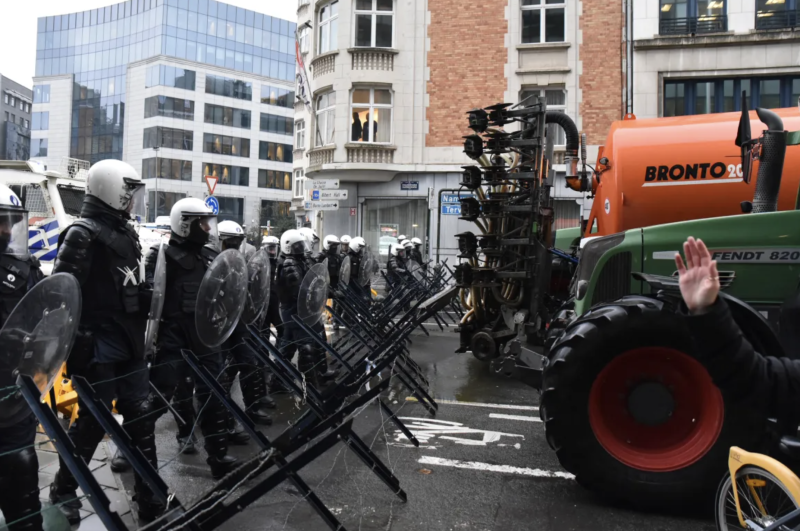
In Brussels’ European quarter, farmers clashed violently with police during a meeting of the EU's agriculture ministers to discuss the ongoing crisis in the 27-member state European Union’s agricultural sector. The demonstration, part of a broader European movement that has now lasted for several months, saw farmers from Spain, Portugal, Italy, and Belgium expressing frustration over issues such as high production costs, low prices for their products, cheap non-EU imports, and stringent EU environmental regulations.
The agricultural sector contributes to 11% of the European Union's greenhouse gas emissions. To address this, the EU aims to reform its Common Agricultural Policy with an annual subsidy program valued at nearly $60 billion. The proposed changes, integral to the European green deal's objective of achieving climate neutrality by 2050, involve mandating farmers to allocate a minimum of 4% of arable land to non-productive elements. Additionally, farmers would be required to implement crop rotations and decrease fertilizer usage by a minimum of 20%.
Farmers are expressing concerns over a multitude of challenges within the EU’s agricultural system, including declining sale prices, escalating costs, stringent regulations, the dominance of powerful firms, mounting debt, the impacts of the climate crisis, and the influence of cheap foreign imports.
The costs incurred by farmers, notably for energy, fertilizers, and transportation, have surged manyfold in several EU countries, particularly after Russia's invasion of Ukraine in February 2022.
Analysis of Eurostat data by Politico reveals that farm-gate prices, the fundamental prices farmers receive for their products, experienced an average drop of nearly 9% between the third quarter of 2022 and the corresponding period in the previous year. Only a few products, such as olive oil, which were affected by shortages, deviated from this downward trend.
The issue of imports is a significant source of discontent, particularly in central and eastern Europe. The influx of inexpensive agricultural goods from Ukraine, for which the EU waived quotas and duties following Russia's invasion, has led to a decline in prices and heightened resentment due to perceived unfair competition.
Simultaneous protests have unfolded in Madrid and along the Polish-German border, indicative of a broad ranging display of discontent. In the Belgian capital, approximately 900 tractors clogged the streets, with protesters hurling bottles and eggs. Riot police responded by using water cannons to control the situation.
The timing of these protests, just ahead of the European parliament elections, raised concerns among leaders about potential gains for far-right populist parties. The demonstrations followed an incident at the Paris agricultural fair where French President Emmanuel Macron faced heckling from angered farmers.
Amidst the clashes, EU agriculture ministers convened to discuss potential solutions to the farmers' grievances. The European Commission proposed measures to ease the burden on farmers, including simplifying the Common Agricultural Policy (CAP) by reducing farm inspections and exempting small farms from specific environmental rules. French Agriculture Minister Marc Fesneau emphasized the need for practical and operational solutions, indicating a willingness to consider legislative changes.
The protests extended beyond Brussels, with farmers in Madrid demanding the loosening of regulations and changes to the CAP.
In Poland, farmers blocked a major highway at the border with Germany, protesting against cheap imports from non-EU Ukraine. This protest, according to Adrian Wawrzyniak, a spokesperson for the Solidarity Farmers' Union, showcased joint solidarity between Polish and German farmers.
Despite the intensity of the protests, some ministers, such as Belgium's David Clarinval and Ireland's Charlie McConalogue, called for a peaceful approach. Clarinval acknowledged that farmers' complaints were heard but urged them to refrain from violence. McConalogue emphasized the importance of slashing red tape to address the farmers' concerns.
The farmers representing farming collective La Via Campesina called for the establishment of minimum support prices and the revision of free trade agreements allowing the import of cheaper foreign produce. They argued that higher prices were necessary for the transition to more ecological farming practices.
In Poland, farmers highlighted their discontent with EU regulations and bureaucracy, demanding changes to the EU’s Common Agricultural Policy.
Poland's Prime Minister, Donald Tusk, acknowledged that the farmers' problems needed to be addressed at the EU level, framing it as a broader issue affecting EU agriculture as a whole.

